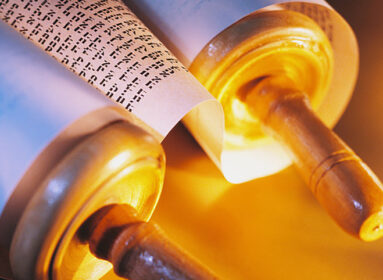
By Shlomo Riskin
“…for the entire congregation are all holy, and God is in their midst. So why do you raise yourselves above God’s assembly?” [Num. 16:3]
Where did Korach err in his rebellion against Moses and Aaron? On the surface, his argument appears to be both logical and just: “You [Moses and Aaron] have gone too far. The entire congregation is holy, and God is in their midst. So why do you raise yourselves above God’s assembly?” Indeed, did not the Torah command the nation, “You shall be holy” (Lev. 19:2)?
According to Korach, if, in fact, everyone is equally holy, leadership becomes a mere function of opportunity. The era of the old guard rule (Moses’ family) must come to an end; Korach’s family must be given its chance to express its inherent holiness!
Granted, so goes this argument, God revealed Himself to Moses at the Burning Bush, and spoke directly only to him; but perhaps, if Korach had been raised in the palace of the pharaohs, and if he had had the opportunity as a free man of princely background to slay the Egyptian taskmasters, undoubtedly God would have spoken to him, as well. After all, we are all holy! It’s just that some have received more special opportunities than others! On the surface, Korach’s words contain a glib truth.
In reality, however, Korach and Moses represent two different philosophies of life. At Mount Sinai, God did not declare everyone to be holy. Rather, He placed into the world the possibility of achieving holiness. “You shall be holy” is a command, not a promise or a declaration of an existing fact. It represents a potential, attainable by means of the commitment to a lifestyle of 613 commandments.
When Korach argues that everyone is holy, that he, too, could have achieved what Moses achieved had he only had the proper opportunity, he is, in fact, uprooting holiness, not defending it. After all, if everyone and everything is holy, then the word “holy” loses its meaning. By arguing for holiness in the way that he does, Korach actually argues against holiness. In his view, we need not strive to achieve holiness. We are already holy!
Perhaps this is why the Midrash pictures Korach as taunting Moses about the commandments of tzitzit (ritual fringes) and mezuzah. Does a garment which is wholly tekhelet still require a thread of tekhelet in its ritual fringes? Does a house filled with Torah scrolls still require a mezuzah (which holds only a small portion of a Torah scroll) on its doorpost? And when Moses replies in the affirmative, Korach laughs at the apparent lack of logic in Moses’ teaching!
But Korach misses the point. Moses teaches that the human being must constantly strive to improve, to become more holy than he was before. Humans must never dare rest on their laurels, because evil is always lying in wait to ensnare, even at the mouth of the grave. Hence, even a house filled with Torah scrolls still requires a mezuzah at the front door, and even a garment that is wholly tekhelet still requires ritual fringes. Never be complacent. There is never sufficient holiness; we must always strive for more!
In contrast, Korach maintains that the status quo is holy – because nothing need change, grow, or develop. This is, in fact, the meaning of Korach’s name: the Hebrew root k-r-ch can either mean “bald” – no hair grows on a bald head – or “ice” – no vegetation developed during the Ice Age. “As is his name, so is he.” Korach rejects the command to become holy, the command of meritocracy, because he is cynically scornful of one’s ability to grow and develop and change and inspire. This mistaken worldview is the core flaw of Korach’s rebellion.
Moses’ (and God’s) approach is fundamentally different. When Moses announces to the rebels the means by which God will determine who is holy to Him, he orders Korach and his men bring fire in the fire pans and offer incense. Why?
At its best, fire symbolizes the possibility of change. By means of extreme heat, the hardest materials can be made to bend and melt, can be transformed from solid to liquid and to many states in between. Likewise, incense improves its surroundings: the sweet-smelling fragrance can remove the rancid odor of death and decay, and can transform the slaughtered carcasses of the animal sacrifices into an experience of commitment to God that can perfect the world.
Moses’ vision is one of optimistic faith, the rising flames that draw forth the fragrance of the incense and soar heavenward. Material objects, humanity, the very world can be changed, elevated, and sanctified. All that is required is our merit, commitment, and achievement.
Rabbi Shlomo Riskin is founder and rosh yeshiva of Ohr Torah Stone and founding rabbi of Efrat, Israel.








 Southern New England Jewish Ledger
Southern New England Jewish Ledger













